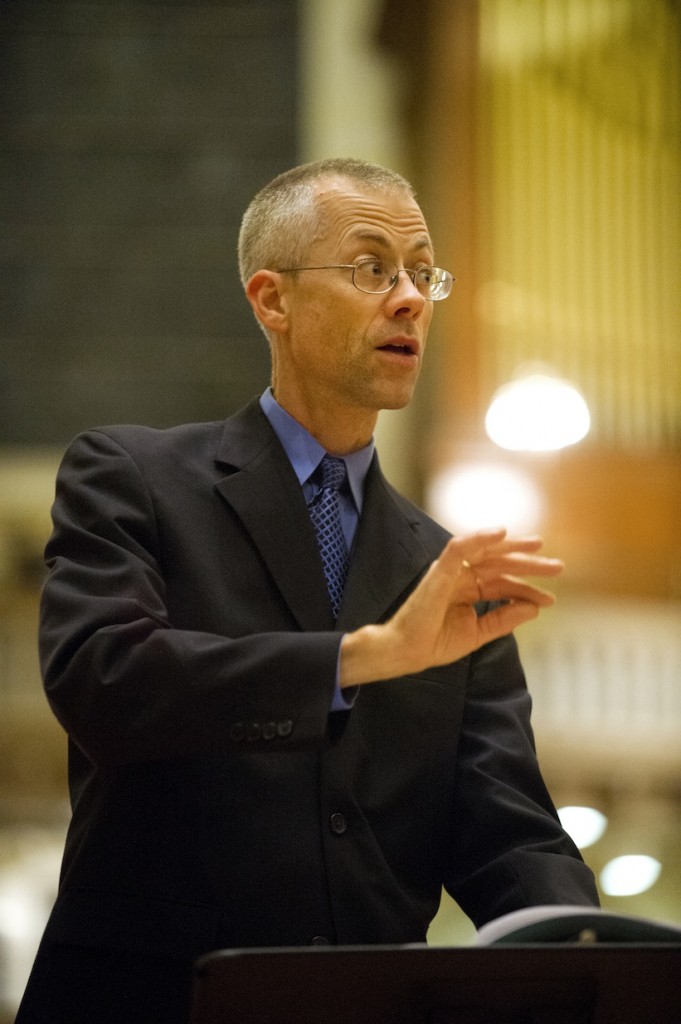Blue Heron takes flight with medieval English Christmas program

Director Scott Metcalfe and Blue Heron presented a program of medieval English Christmas music Friday night at First Church in Cambridge.
Just as “pyrotechnic engineer” is an unusual credit to see in an early music program, Blue Heron took an atypically energetic approach to medieval sacred vocal works, which are often performed with an all too respectful and reserved detachment. From the antiphonal chants to the simple songs and hymns that filled out their well-balanced program Friday night at First Church in Cambridge, Blue Heron harnessed a lively sense of phrasing and perfectly suited dynamics that gave this repertoire a sense of emotional investment.
This “Christmas in Medieval England” program spanned the entire Christmas season, from advent to Christmas Day, drawing on music from around 1440. The ensemble, along with their pyrotechnic engineer, set the tone for the evening by beginning both halves of the performance with plainchant sung by men gathered around a candlelit altar. Then the lights went up and the music alternated between the devotional and the purely liturgical.
The centerpiece of the first half was John Dunstaple’s multitextual, isorhythmic motet Gaude Virgo salutata/Gaude Virgo singularis. The purity of sound associated with the best early music performances was on full display in this robustly contrapuntal yet gentle motet. Countertenor Gerrod Pagenkopf dominated this performance with his bright, powerful voice and assertive delivery without undercutting the group’s tender interpretation.
On either side of the motet were songs of a more modest scope. Prior to the motet, the monophonic Angelus ad virginem was paired with the duet Gabriel fram Heven-King, both of which showcased the two women of the group: Daniela Tosic and Pamela Dellal. Tosic shone in her intimate rendition of Angelus, and later in the lullaby-like song Ther is no rose of swych virtu, while Della gave a nuanced performance in her more animated duet with Michael Barrett. These songs were all accompanied by the oddly twangy, and sometimes distracting, tones of a medieval harp played by director Scott Metcalfe.
Blue Heron rendered the mass movements in the program with equal feeling. Especially striking was the Leonel Power Gloria in the first half. This routine part of the mass has been set innumerable times throughout the ages, but the strong tenor solos gave this one a true sense of emotional individuality. The second Gloria, by Pycard, was unfortunately more subdued and performed with less verve.
The two movements from the anonymous Missa Veterem hominem, a Sanctus and Agnus dei, both with extensive contrapuntal tropes, brought us back to a place of expressive vitality. The Sanctus in particular gained a delightful vigor during the duets which highlighted countertenor Martin Near and bass David McFerrin. The Agnus dei was less impressive, but still reached a high point with a duet between countertenor Pagenkopf and Jason McStoots. In between these two movements, tenors Owen McIntosh and Michael Barrett, along with bass McFerrin, gave a warm performance of the Epiphany carol Ave rex angeloum.
“Christmas in Medieval England” ended on a festive note with the entire ensemble singing the up-tempo carol Nowel sing we bothe al and som, which fully embodied the joyousness associated with the holiday season, followed by an encore of the equally delightful carol Nova Nova.
This program will be repeated 2:30 p.m. and 8 p.m. at First Church in Cambridge. blueheronchoir.org
Posted in Performances